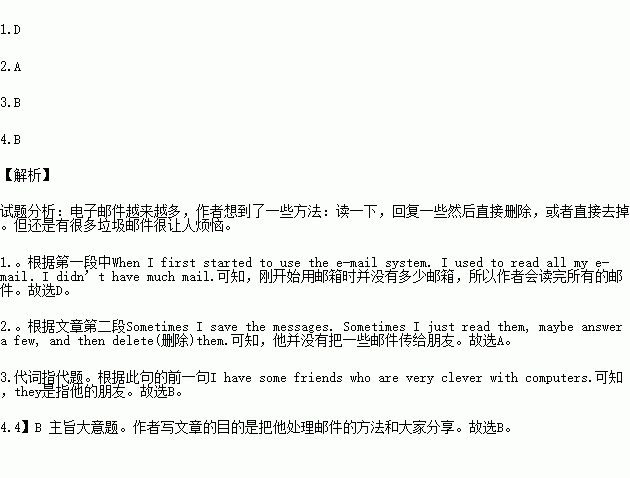题目内容
I am an e?mail user. When I first started to use the e?mail system, I used to read all my e?mail. I didn’t have much mail. I gave my friends my e?mail address. Soon I had more mail than I wanted. Some of the mail was junk mail. I was worried. I didn’t want my mail to control me.
I’ve tried some methods to help me get control of my mail. First, I check my mail at the same time every day. Also I try to allow myself only 15~20 minutes every day to process my e?mail. This doesn’t always work, but I try. Sometimes I save the messages. Sometimes I just read them, maybe answer a few, and then delete(删除) them.
Sometimes I’m not at all interested in a message, so I don’t even open it. I delete it right away. This is very much the way I go through the mail that the postal service delivers to my home.
These methods are very simple. I have some friends who are very clever with computers. From time to time,they teach me new tricks for managing my e?mail. I’m still amazed at what e?mail can do for me! I’m still worried, however, about having too much to read.
1.The writer used to read all his e?mail because ______.
A. he was forced to do that
B. he had nothing else to do
C. he didn’t know how to read mail
D. he didn’t have much mail
2.Which of the following does NOT belong to the ways of the writer’s dealing with his mail?
A. Passing some on to his friends.
B. Just reading some.
C. Deleting some.
D. Saving the messages.
3.What does the underlined word “they” in the last paragraph refer to?
A. messages. B. friends.
C. computers. D. methods.
4.What’s the purpose of the writer to write this passage?
A. To share happiness in using mail with us.
B. To share some methods of using computer with us.
C. To share some worries in using mail with us.
D. To persuade us out of using mail.
 期末集结号系列答案
期末集结号系列答案
